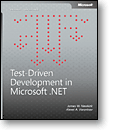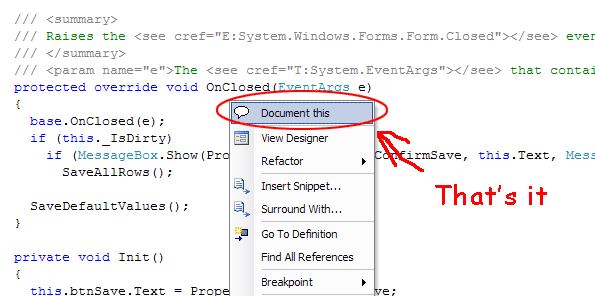I have unit tested my code for years now, but have never got around to using a unit testing framework like NUnit. I’ve been dancing around it for some time now, but haven’t had the time to get to know it or maybe I just forgot about it. I manually write my tests and it works fine, but it does not provide the level of consistency that NUnit provides.
So I decided to read the book "Test-Driven Development in Microsoft .NET", to get me started, or at least inspired. The book is written by James Newkirk and Alexei Vorontsov. James works with Patterns & Practices at Microsoft and has also been involved in developing NUnit. So who better to write a book about test driven development (TDD) than him??
 The book does a very good job describing the philosophy behind TDD and the idea of writing scenario based unit tests. I have never thought of doing that, even though it is very simple. That covers about 3 of the chapters, and they were very informative and interesting.
The book does a very good job describing the philosophy behind TDD and the idea of writing scenario based unit tests. I have never thought of doing that, even though it is very simple. That covers about 3 of the chapters, and they were very informative and interesting.
The funny thing is that the book is about TDD, it says so on the cover. Nevertheless, the authors spend approximately 9 chapters writing about something else. If I wanted to know more about creating web services, I would buy a book about it. The same goes for refactoring and data access code.
The book is written for beginners to .NET development, even though the authors claim it is for experienced programmers. If you are an experienced programmer, expect to be bored for three quarters of the book.
My guess is that the authors had written their 3 interesting chapters when the publisher, Microsoft Press, wanted at least 12. So the authors had to write a lot of words to get to the 12 chapters - and so they did. The book suffers from the same disease as "Naked Conversations" does - example overflow. Read my review of Naked Conversations here.
However, the three good chapters are actually worth the while, so I will recommend the book, but instruct people to skip 9 chapters.

 The book does a very good job describing the philosophy behind TDD and the idea of writing scenario based unit tests. I have never thought of doing that, even though it is very simple. That covers about 3 of the chapters, and they were very informative and interesting.
The book does a very good job describing the philosophy behind TDD and the idea of writing scenario based unit tests. I have never thought of doing that, even though it is very simple. That covers about 3 of the chapters, and they were very informative and interesting.